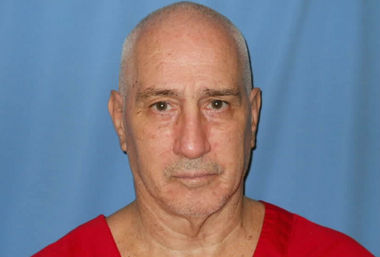

JACKSON, Mississippi (AP) — Richard Gerald Jordan is the oldest inmate on Mississippi’s death row at 68.
He is also the longest serving death row inmate at 37 years.
Jordan was convicted of capital murder committed in the course of a kidnapping and was sentenced to death on four separate occasions. Following the first three convictions, Jordan challenged his death sentence successfully, was re-tried, and was again re-sentenced to death.
Jordan, now 68, was convicted of kidnapping and killing Edwina Marta in Harrison County on Jan. 13, 1976. He was accused of collecting a $25,000 ransom from Marta’s husband, then taking the woman to a wooded area in north Harrison County and shooting her in the back of the head
In 1991, after a third successful challenge to his sentence, Jordan entered into an agreement with the prosecution to serve a sentence of life imprisonment without parole in exchange for not further contesting his sentence.
Jordan appealed to the Supreme Court, saying he had agreed to the sentence but it was invalid under state law.
The Supreme Court in 1997 agreed, ruling life without parole as a sentencing option did not exist until July 1, 1994. The justices said the only sentences available to Jordan were death or life imprisonment with parole. The justices ordered a new sentencing hearing.
Thereafter, Jordan sought to a life with parole sentence. The prosecutor refused. The prosecutor said that, because Jordan “violated” the first agreement by asking the court to change his earlier sentence, the prosecutor would not again enter into a plea agreement with Jordan for a life sentence.
The prosecutor instead successfully sought the death penalty for the fourth time in a 1998 sentencing trial.
In a post-conviction appeal denied in June, two members of a three-judge panel of the 5th U.S. Circuit Court of Appeals rejected Jordan’s arguments of prosecutorial vindictiveness and ineffective assistance of counsel. Jordan argued his attorneys at the 1988 sentencing didn’t do a good job of protecting his rights.
A third judge, James L. Dennis, said Jordan should get to appeal the issue of vindictiveness.
“The prosecutor had a ‘considerable stake’ in Jordan accepting his life-without-parole sentence without challenge and, when Jordan did lodge a challenge, the prosecutor ‘upped the ante’ by deciding that a life sentence of any sort was no longer acceptable and only death would now suffice,” Dennis said.
The two other judges said Jordan did not presented any evidence of actual prosecutorial vindictiveness.
Jordan’s options now are to ask the full 5th Circuit to review his petition or file a motion with the U.S. Supreme Court.



